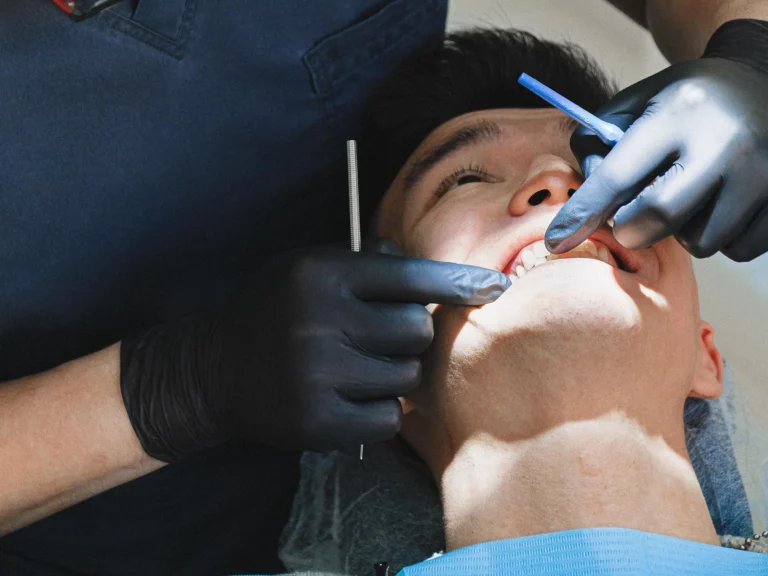PROUDLY SERVING DENTAL PRACTICES AND
DENTAL PROFESSIONALS NATIONWIDE
PROUDLY SERVING DENTAL PRACTICES AND
DENTAL PROFESSIONALS NATIONWIDE

A Dental Hygienist is a licensed professional specializing in preventive dental care. Their role is primarily to promote good oral health practices resulting in dental disease prevention such as cavities and gum disease.
Dental Hygienists are extensively trained and educated in oral hygiene, anatomy, and several different dental procedures. They play an important role in patient care by providing recommendations, assessments, and educational information.
They may also assist dentists during dental procedures or collaborate with the admin team to bring about comprehensive care.
A typical day for Dental Hygienists could be spent performing a variety of tasks including cleaning and polishing teeth, taking dental x-rays, applying fluoride treatments, and educating patients on proper oral hygiene techniques.
A Dental Hygienist may also assess oral health, screen problems, and refer to a dentist for a treatment plan. Dental Hygienists play an important role in regards to educating patients on how to maintain good oral hygiene habits and prevention in the future. Here are some of the tasks performed by Dental Hygienists in detail:
1: Dental Cleaning
Dental Hygienists remove tarter and plaque buildup, ensuring cleaner teeth and gums. They enhance the enamel strength and prevent decay through polishing and fluoride treatments.
2: Dental X-rays
Dental hygienists do X-rays by capturing detailed imagery to aid diagnosis of oral health issues. They ensure positioning, and safety protocols and assist dentists in identifying under-the-surface problems such as bone loss or cavities.
3: Tooth Scaling and Root Planing
Dental hygienists perform tooth scaling, removal of stubborn plaque and tartar from the tooth, and blow the gum line. They conduct root planning with precision, by smoothing the tooth to avoid any bacterial buildups and to promote good gum health. This precision technique in scaling and root planning is crucial to maintaining optimal oral hygiene.
4: Oral Health Screenings
Dental Hygienists look at oral health indicators such as gums condition, decay, and abnormalities, helping with early detection and intervention. Through these oral health screenings, cavities, gum diseases, and oral cancer identification are done.
5: Administering Local Anesthesia
To ensure patient comfort during painful dental procedures, Dental Hygienists administer local anesthesia. The procedure requires careful assessment of dosage to avoid any risks while providing effective pain relief. Their expertise in the procedure ensures a smooth and comfortable dental experience for patients.
6: Dental Sealants
To provide a protective barrier against tooth decay on vulnerable tooth surfaces, Dental hygienists apply dental sealants. This coat covers all the grooves and pits of teeth, preventing bacteria or food particles from accumulating and damaging the teeth.
7: Dental History Review
Dental Hygienists review the patient’s history including conditions, concerns, and any past procedures. This essential information is used to create a personalized treatment plan for each patient’s needs.
8: Fluoride Treatments
Dental Hygienists carefully apply fluoride treatment to strengthen tooth enamel and prevent any loss. This process enhances resistance to acid erosion and helps promote overall dental health.
9: Oral Hygiene Instructions
Personalized oral hygiene instructions are tailored for each patient by Dental Hygienists. Guiding the patients about proper teeth brushing, flossing, and mouthwash techniques is part of the process. Educating individuals to maintain healthy oral habits for their specific needs and conditions.
Dental hygiene is important to prevent oral diseases like tooth decay and gum diseases and maintaining healthy teeth and gum as well as preventing bad breath. Oral health is also linked to systematic conditions such as heart disease and diabetes. Good oral hygiene promotes self-esteem and confidence through a healthy smile, it plays a vital role in enhancing oral health and well-being.
Depending upon which state/country you are in there are different programs. Typically, an individual needs to complete a dental hygiene program resulting in an associate degree or bachelor’s degree in dental hygiene. The coursework includes anatomy, physiology, radiography, pharmacology, and dental hygiene tech. In the United States, after completing their education, individuals must pass the National Board Dental Hygiene Examination and any state-specific licensure exams. Becoming a dental hygienist requires dedication to education and training. The commitment to promote oral health and quality patient care are major aspects of becoming a good dental hygienist.
Dental hygienists and dentists are essential roles in the dental healthcare office, however, they have different roles and responsibilities that supplement each other’s work.
Dentists are healthcare professionals holding licenses to diagnose, treat, and manage overall dental health. Dentists are qualified to perform a multitude of dental procedures such as fillings, root canals, tooth extractions, and dental implants. They oversee treatment plans, perform surgeries, and mostly look at advanced dental issues.
Dental hygienists on the other hand specialize in preventive care and education. Their focus is cleaning teeth, removing tartar and plaque, dental screenings, and providing oral care instructions personalized for each case/patient. They also administer fluoride treatments, take dental X-rays, and apply sealants. Dental hygienists do not diagnose or treat dental diseases.
Dental hygienists and dental assistants are both essential roles in the dental healthcare office, however, they have different roles and responsibilities that supplement each other’s work.
Dental hygienists specialize in preventive care and patient education. Their focus is cleaning teeth, removing tartar and plaque, dental screenings, and providing oral care instructions personalized for each case/patient. They also administer fluoride treatments, take dental X-rays, and apply sealants.
Dental Assistants provide chairside assistance to dentists during dental procedures. Their duties include preparing patients, sterilizing and handing the instruments to the dentist during procedures, taking teeth impressions, and processing of dental X-rays. They also assist in administrative work such as Scheduling Appointments and maintaining billing and patient records. Dental assistants play a crucial role in supporting a lot of work at a dental office.